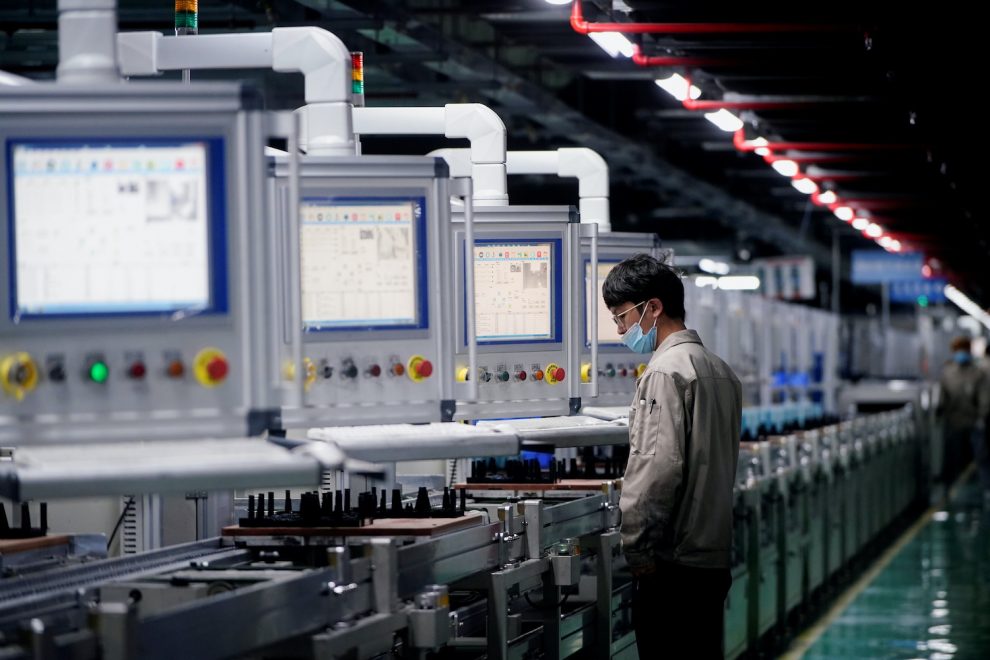The world’s second biggest economy has rebounded in impressive style after a Covid-hit year but its factory output slowed again in June
Soaring raw materials costs, the ongoing semiconductor shortage and Covid were all blamed for dragging down China’s factory output in June.
Growth in the country’s June factory activity dipped to a four-month low, figures released on Wednesday revealed, with wider supply chain disruptions across Asia also cited.
The chip supply crunch has hammered other manufacturing powerhouses in Asia. Industrial output in Japan and South Korea slumped in May from the previous month as auto production declined due to semiconductor shortages, adding to concerns of flagging momentum in their respective economies.
Also on AF: Asia’s frontier economies face risks from low jab-rates and US bond yields
China’s June official manufacturing Purchasing Manager’s Index (PMI) eased slightly to 50.9 versus 51.0 in May, data from the National Bureau of Statistics showed on Wednesday. It, however, exceeded analysts’ forecast for a slowdown to 50.8.
It remained above the 50-point mark that separates growth from contraction on a monthly basis.
“This was largely a result of Covid, which has affected factory output and also new export orders due to the rising waves of infections and resultant restrictions in some neighbouring economies,” said Iris Pang, Great China chief economist at ING.
“Overall, (it’s) not a great month but no really worrying signs… China’s growth rate is still positive, though it would be a lot lower in H2 than H1, mostly because of the change in base effects,” said Pang, referring to year-ago comparisons with 2020’s pandemic disruptions.
POWER CRUNCH
A shortage of coal supply in China’s southern regions, which started in mid-May, hit factory operations though the government has said the power crunch should ease soon.
New export orders fell for a second consecutive month in June and at a faster pace, likely due to the global resurgence of Covid variants, forcing some countries to reimpose lockdowns.
A sub-index for raw material costs in the official PMI stood at 61.2 in June, compared with May’s 72.8, as the government cracked down on high raw material prices.
PANDEMIC DISRUPTIONS
Growth in new orders, however, picked up, as domestic demand improved.
The world’s second-largest economy has largely recovered from disruptions caused by the pandemic, with the consumption and service sectors seen catching up to exports and manufacturing, though gross domestic product growth is set to moderate.
“Much of the recovery has occurred and the momentum is slowing. Combined with a relatively higher base, this means year-on-year GDP growth is expected to slow to 7.2% in Q2 from 18.3% in Q1,” said analysts at HSBC.
PROPERTY CLAMPDOWNS
However, in two-year average terms, they expect growth to pick up to 5.2% from 5.0%, though this is still below pre-pandemic levels of 6.0% growth.
The official non-manufacturing Purchasing Managers’ Index (PMI) fell to 53.5 in June from 55.2 in May, a separate survey from the NBS showed, dampened by a sharp pull-back in the recovery of the services sector due to local Covid outbreaks.
The construction index held steady at 60.1, although analysts expect the sector to face headwinds amid Beijing’s clampdown on the property market.
- Reporting by Reuters
Read more:
China factory gate prices rise at fastest pace in 13 years
China factory gate price jump raises global inflation concern
























